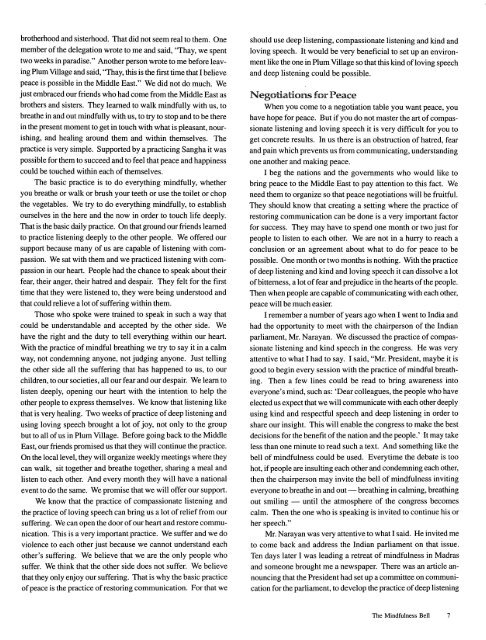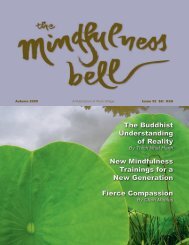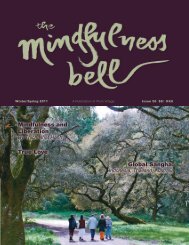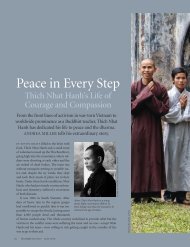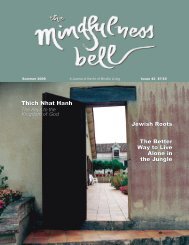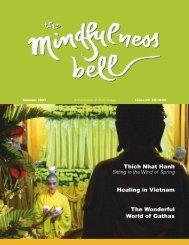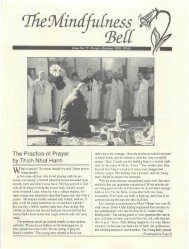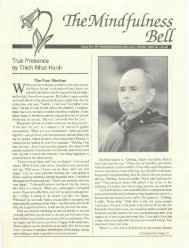Thay Giac Thanh June 9, 1947 - The Mindfulness Bell
Thay Giac Thanh June 9, 1947 - The Mindfulness Bell
Thay Giac Thanh June 9, 1947 - The Mindfulness Bell
Create successful ePaper yourself
Turn your PDF publications into a flip-book with our unique Google optimized e-Paper software.
otherhood and sisterhood. That did not seem real to them. One<br />
member of the delegation wrote to me and said, "<strong>Thay</strong>, we spent<br />
two weeks in paradise." Another person wrote to me before leaving<br />
Plum Village and said, ''1bay, this is the first time that I believe<br />
peace is possible in the Middle East." We did not do much. We<br />
just embraced our friends who had come from the Middle East as<br />
brothers and sisters. <strong>The</strong>y learned to walk mindfully with us, to<br />
breathe in and out mindfully with us, to try to stop and to be there<br />
in the present moment to get in touch with what is pleasant, nourishing,<br />
and healing around them and within themselves. <strong>The</strong><br />
practice is very simple. Supported by a practicing Sangha it was<br />
possible for them to succeed and to feel that peace and happiness<br />
could be touched within each of themselves.<br />
<strong>The</strong> basic practice is to do everything mindfully, whether<br />
you breathe or walk or brush your teeth or use the toilet or chop<br />
the vegetables. We try to do everything mindfully, to establish<br />
ourselves in the here and the now in order to touch life deeply.<br />
That is the basic daily practice. On that ground our friends learned<br />
to practice listening deeply to the other people. We offered our<br />
support because many of us are capable of listening with compassion.<br />
We sat with them and we practiced listening with compassion<br />
in our heart. People had the chance to speak about their<br />
fear, their anger, their hatred and despair. <strong>The</strong>y felt for the first<br />
time that they were listened to, they were being understood and<br />
that could relieve a lot of suffering within them.<br />
Those who spoke were trained to speak in such a way that<br />
could be understandable and accepted by the other side. We<br />
have the right and the duty to tell everything within our heart.<br />
With the practice of mindful breathing we try to say it in a calm<br />
way, not condemning anyone, not judging anyone. Just telling<br />
the other side all the suffering that has happened to us, to our<br />
children, to our societies, all our fear and our despair. We learn to<br />
listen deeply, opening our heart with the intention to help the<br />
other people to express themselves. We know that listening like<br />
that is very healing. Two weeks of practice of deep listening and<br />
using loving speech brought a lot of joy, not only to the group<br />
but to all of us in Plum Village. Before going back to the Middle<br />
East, our friends promised us that they will continue the practice.<br />
On the local level, they will organize weekly meetings where they<br />
can walk, sit together and breathe together, sharing a meal and<br />
listen to each other. And every month they will have a national<br />
event to do the same. We promise that we will offer our support.<br />
We know that the practice of compassionate listening and<br />
the practice of loving speech can bring us a lot of relief from our<br />
suffering. We can open the door of our heart and restore communication.<br />
This is a very important practice. We suffer and we do<br />
violence to each other just because we cannot understand each<br />
other's suffering. We believe that we are the only people who<br />
suffer. We think that the other side does not suffer. We believe<br />
that they only enjoy our suffering. That is why the basic practice<br />
of peace is the practice of restoring communication. For that we<br />
should use deep listening, compassionate listening and kind and<br />
loving speech. It would be very beneficial to set up an environment<br />
like the one in Plum Village so that this kind ofloving speech<br />
and deep listening could be possible.<br />
NegotiatiolIlS for Peace<br />
When you come to a negotiation table you want peace, you<br />
have hope for peace. But if you do not master the art of compassionate<br />
listening and loving speech it is very difficult for you to<br />
get concrete results. In us there is an obstruction of hatred, fear<br />
and pain which prevents us from communicating, understanding<br />
one another and making peace.<br />
I beg the nations and the governments who would like to<br />
bring peace to the Middle East to pay attention to this fact. We<br />
need them to organize so that peace negotiations will be fruitful.<br />
<strong>The</strong>y should know that creating a setting where the practice of<br />
restoring communication can be done is a very important factor<br />
for success. <strong>The</strong>y may have to spend one month or two just for<br />
people to listen to each other. We are not in a hurry to reach a<br />
conclusion or an agreement about what to do for peace to be<br />
possible. One month or two months is nothing. With the practice<br />
of deep listening and kind and loving speech it can dissolve a lot<br />
of bitterness, a lot of fear and prejudice in the hearts of the people.<br />
<strong>The</strong>n when people are capable of communicating with each other,<br />
peace will be much easier.<br />
I remember a number of years ago when I went to India and<br />
had the opportunity to meet with the chairperson of the Indian<br />
parliament, Mr. Narayan. We discussed the practice of compassionate<br />
listening and kind speech in the congress. He was very<br />
attentive to what I had to say. I said, "Mr. President, maybe it is<br />
good to begin every session with the practice of mindful breathing.<br />
<strong>The</strong>n a few lines could be read to bring awareness into<br />
everyone's mind, such as: 'Dear colleagues, the people who have<br />
elected us expect that we will communicate with each other deeply<br />
using kind and respectful speech and deep listening in order to<br />
share our insight. This will enable the congress to make the best<br />
decisions for the benefit of the nation and the people.' It may take<br />
less than one minute to read such a text. And something like the<br />
bell of mindfulness could be used. Every time the debate is too<br />
hot, if people are insulting each other and condemning each other,<br />
then the chairperson may invite the bell of mindfulness inviting<br />
everyone to breathe in and out - breathing in calming, breathing<br />
out smiling - until the atmosphere of the congress becomes<br />
calm. <strong>The</strong>n the one who is speaking is invited to continue his or<br />
her speech."<br />
Mr. Narayan was very attentive to what I said. He invited me<br />
to come back and address the Indian parliament on that issue.<br />
Ten days later I was leading a retreat of mindfulness in Madras<br />
and someone brought me a newspaper. <strong>The</strong>re was an article announcing<br />
that the President had set up a committee on communication<br />
for the parliament, to develop the practice of deep listening<br />
<strong>The</strong> <strong>Mindfulness</strong> <strong>Bell</strong> 7


